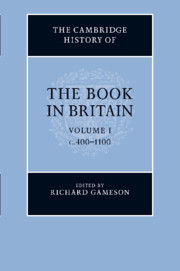Book contents
- Frontmatter
- 1 From Vindolanda to Domesday: the book in Britain from the Romans to the Normans
- PART I THE MAKING OF BOOKS
- PART II THE CIRCULATION OF BOOKS
- PART III TYPES OF BOOKS AND THEIR USES
- 15 The book in Roman Britain
- 16 The use of the book in Wales, c. 400–1100
- 17 The biblical manuscripts of Anglo-Saxon England
- 18 Anglo-Saxon gospel-books, c. 900–1066
- 19 Liturgical books
- 20 Anglo-Saxon prayerbooks
- 21 Psalters
- 22 Music books
- 23 Anglo-Saxon schoolbooks
- 24 Law books
- 25 Manuscripts of the Anglo-Saxon Chronicle
- 26 Old English homiliaries and poetic manuscripts
- PART IV COLLECTIONS OF BOOKS
- PART V CODA
- Bibliography
- Concordance of named manuscripts
- Index of manuscripts
- General Index
- Plate 4.1: The Lindisfarne Gospels"
- Plate 5.1: The Lichfield/St Chad Gospels"
22 - Music books
from PART III - TYPES OF BOOKS AND THEIR USES
Published online by Cambridge University Press: 28 March 2012
- Frontmatter
- 1 From Vindolanda to Domesday: the book in Britain from the Romans to the Normans
- PART I THE MAKING OF BOOKS
- PART II THE CIRCULATION OF BOOKS
- PART III TYPES OF BOOKS AND THEIR USES
- 15 The book in Roman Britain
- 16 The use of the book in Wales, c. 400–1100
- 17 The biblical manuscripts of Anglo-Saxon England
- 18 Anglo-Saxon gospel-books, c. 900–1066
- 19 Liturgical books
- 20 Anglo-Saxon prayerbooks
- 21 Psalters
- 22 Music books
- 23 Anglo-Saxon schoolbooks
- 24 Law books
- 25 Manuscripts of the Anglo-Saxon Chronicle
- 26 Old English homiliaries and poetic manuscripts
- PART IV COLLECTIONS OF BOOKS
- PART V CODA
- Bibliography
- Concordance of named manuscripts
- Index of manuscripts
- General Index
- Plate 4.1: The Lindisfarne Gospels"
- Plate 5.1: The Lichfield/St Chad Gospels"
Summary
The first music books in Britain
The earliest reference to books of music used in the English church is in Bede’s Ecclesiastical History of the English People:
Benedict received this Abbot John and brought him to Britain in order that he might teach the monks of his monastery the mode of chanting throughout the year as it was practised at St Peter’s in Rome. Abbot John carried out the pope’s instructions and taught the cantors of the monastery the order and manner of singing and reading aloud and also committed to writing all things necessary for the celebration of festal days throughout the whole year; these writings have been preserved to this day in the monastery and copies have now been made by many others elsewhere.
The committal in writing of ‘all things necessary for the celebration of festal days’, and the making of copies from this central source for use elsewhere, suggests a perceived need to perform the liturgy in a specific way, recognised as being correct: without a written version, ‘the order and manner of singing and reading aloud’ might not be properly maintained. Within Bede’s words a paradox lies hidden, however: what was being recorded in written form might include information about texts to be sung (as incipits or full texts), and texts to be read (ditto), along with rubrics about how the liturgy was to be performed, but it was all in the medium of words alone.
Keywords
- Type
- Chapter
- Information
- The Cambridge History of the Book in Britain , pp. 482 - 506Publisher: Cambridge University PressPrint publication year: 2011
- 3
- Cited by

